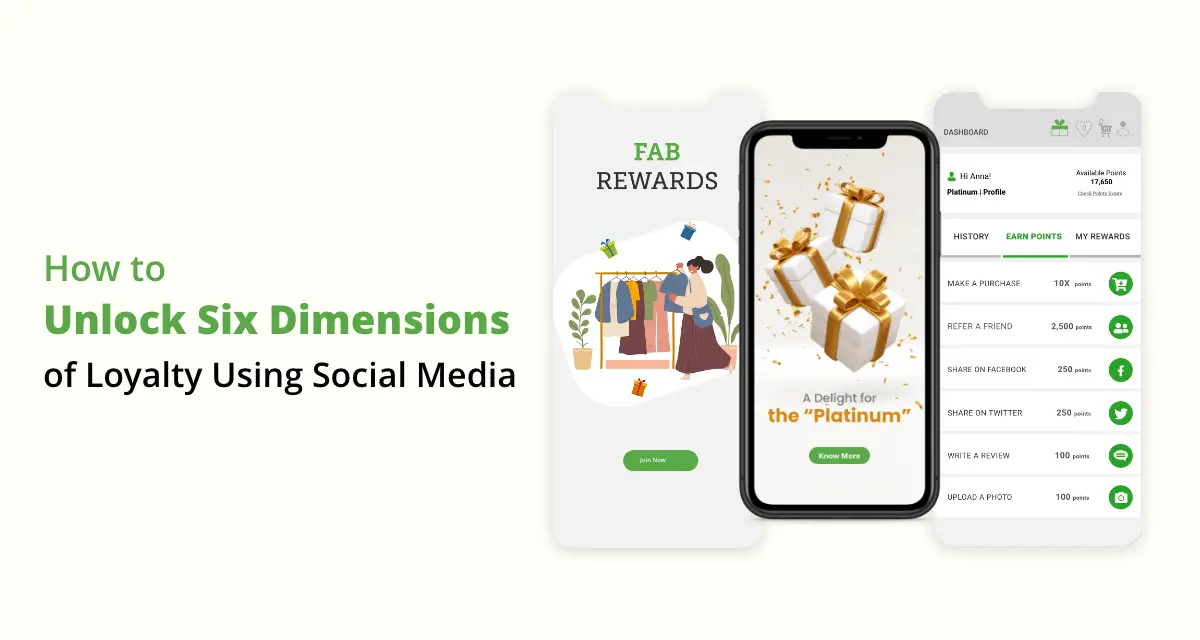Social media has become such a big part of our lives that we check our phones, post things, and look at other people’s posts daily. It’s reached the point where a few individuals still don’t have a social media profile is seen as a peculiarity today.
The rise of social media has changed the way we share and discuss information, as well as engage with the brands we love. According to Statista, social media usage is one of the most popular online activities. In 2021, over 4.26 billion people were using social media worldwide, a number projected to increase to almost six billion in 2027.
It’s become normal to go to your favorite brand’s Twitter, TikTok, or Instagram page or at least see their posts in your feeds. From a business point of view, whether you have a well-known brand or are just starting, any social media platform is a good place to start building a community and a loyal following.
Many individuals keep thinking of “brand loyalty” as merely a campaign. Yet loyalty encompasses far more than that. A well-thought loyalty program must span across multiple platforms. How can we generate loyalty moments throughout a person’s life that are not just transactional? Brands need to create these special moments with their customers with the help of social media.
Social media is where billions of people create countless moments every day. Be where your customers are. Every second spent on social media impacts an individual’s decision-making process. But just being on social media is useless if you don’t engage with people. Zinrelo’s holistic loyalty approach with the help of social media is the perfect mix to unlock multiple dimensions of loyalty, including transactional, social, advocacy, engagement, behavioral, and emotional. There’s no one-size-fits-all answer to this question, as the holistic loyalty approach will vary depending on your customers’ needs. For example, transactional loyalty can help convince new customers to buy from you again, while behavioral loyalty and engagement-based loyalty programs can help customers trust your brand more. Each loyalty dimension has its benefits, and the best way to get the most out of them is to use them based on how customers respond on social media.
Let’s examine how brands use different loyalty dimensions on social media to achieve customer retention.
1. Transactional Loyalty: Starbucks Rewards Program
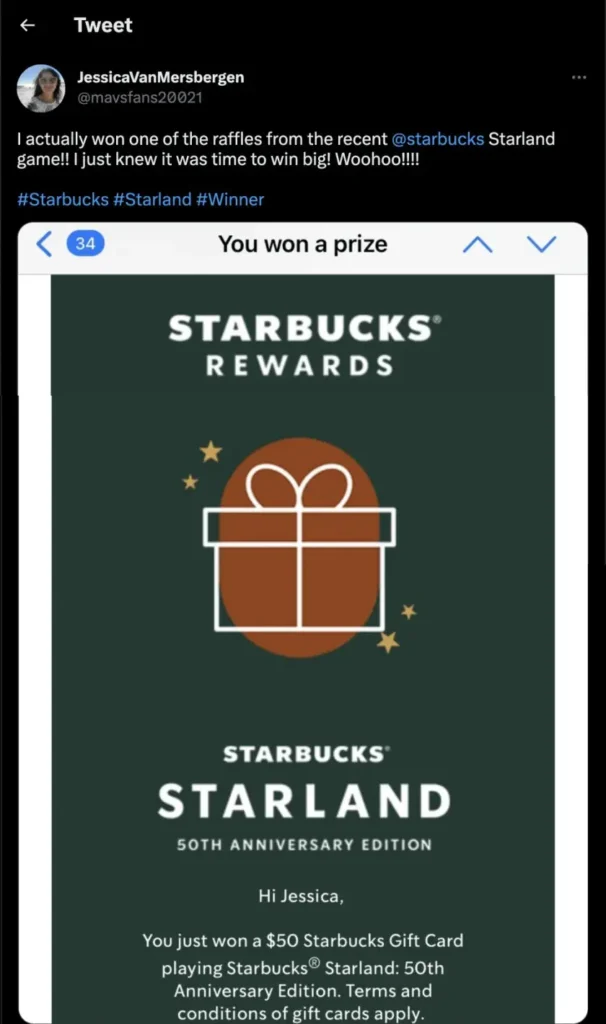
Starbucks’ loyalty program is one of the world’s most popular customer loyalty programs. In 2020, Starbucks launched a social media campaign called “Starland, ” a transactional loyalty program with a gamification element. Customers could participate in the Starland campaign by logging into their Starbucks Rewards account on the Starland website or mobile app. The virtual game involved clicking on stars to reveal prizes and earn bonus stars, which could then be redeemed for free food or drinks at Starbucks. Customers could also earn stars by making qualifying purchases in-store or through the Starbucks app. To promote the campaign on social media, Starbucks utilized various platforms such as Instagram and Twitter to share content related to the Starland game and encourage customers to participate and in turn others to participate.
The campaign ran for six weeks and was a huge success, with customers participating in the game and making purchases to earn stars and rewards. The Starland campaign increased customer engagement and loyalty through a fun and interactive campaign that incentivized purchases.
2. Social Loyalty: Beauty Insider by Sephora
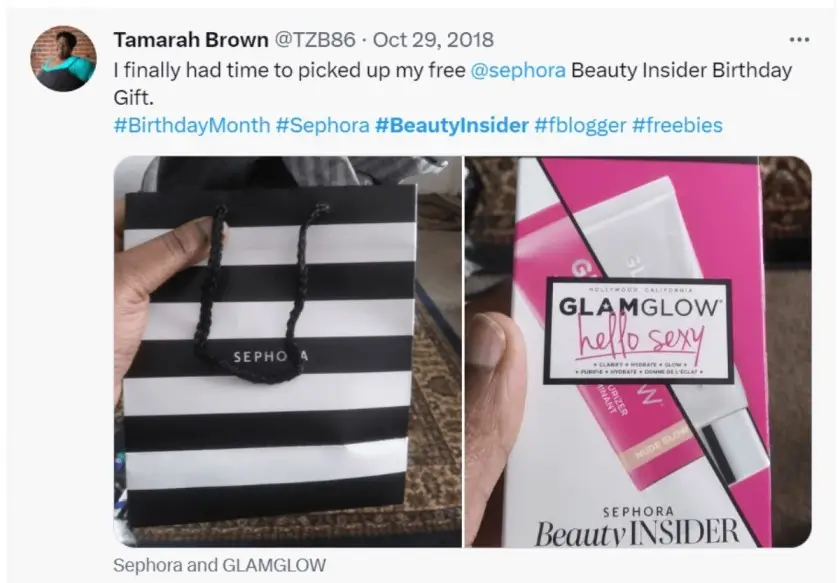
Beauty Insider, which is Sephora’s loyalty program, is one of the most talked-about loyalty programs in retail. It is a social loyalty program that rewards customers for engaging with the brand through their purchases and social media activity. Customers can sign up for the program online or in-store and earn points for every purchase they make at Sephora, which can be redeemed for rewards such as free products and exclusive access to events.
Additionally, customers can earn points by engaging with Sephora on social media, such as following Sephora on Instagram or leaving a review. Beauty Insider members also receive exclusive perks, including free shipping and early access to new products. With rewards like below, brands like Sephora are able to strike an emotional chord with customers. Tamarah brown through the beauty insider program was awarded a free gift on her birthday, an effective way to deliver a customer loyalty program.
Overall, the program aims to reward and strengthen the loyalty of Sephora’s customers by offering them exclusive benefits and encouraging them to engage with the brand on a regular basis.
3. Engagement Loyalty: Piece of the Pie by Domino’s
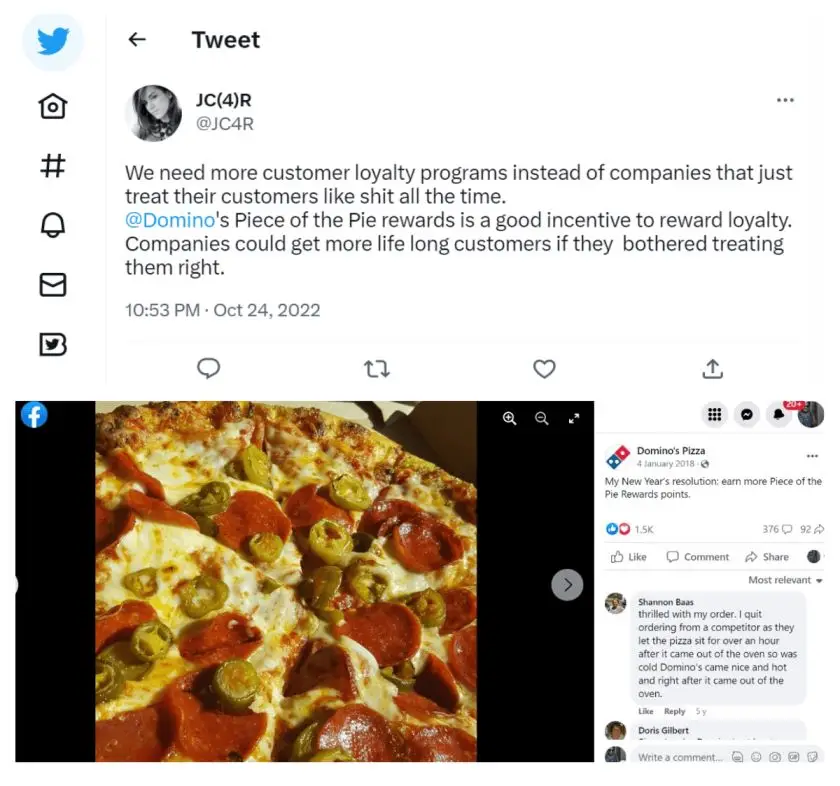
If you want to excite your customers about your rewards program, one of the best ways is to create engagement via social media. Domino’s Pizza delighted pizza lovers everywhere by launching a new loyalty program promotion, “Piece of the Pie,” that allows customers to earn points for each online order they place.
To participate in the loyalty program, customers had to create a Domino’s account and place their orders online. For each online order, customers earn 10 points, and once they have earned 60 points, they can redeem them for a free medium two-topping pizza. One of the unique features of the Piece of the Pie Rewards program is its integration with social media. Customers shared their opinion with friends on Facebook, Twitter, or other social media platforms, encouraging them to order from Domino.
The program also includes a leaderboard that tracks customers’ progress and encourages friendly competition among participants. By encouraging more customers to enjoy Pizza together, discuss it with friends, and post images, Domino’s has effectively attracted more people to their community and provided them with clear opportunities to join, engage, and contribute.
4. Advocacy Loyalty: NikePlus Loyalty Program
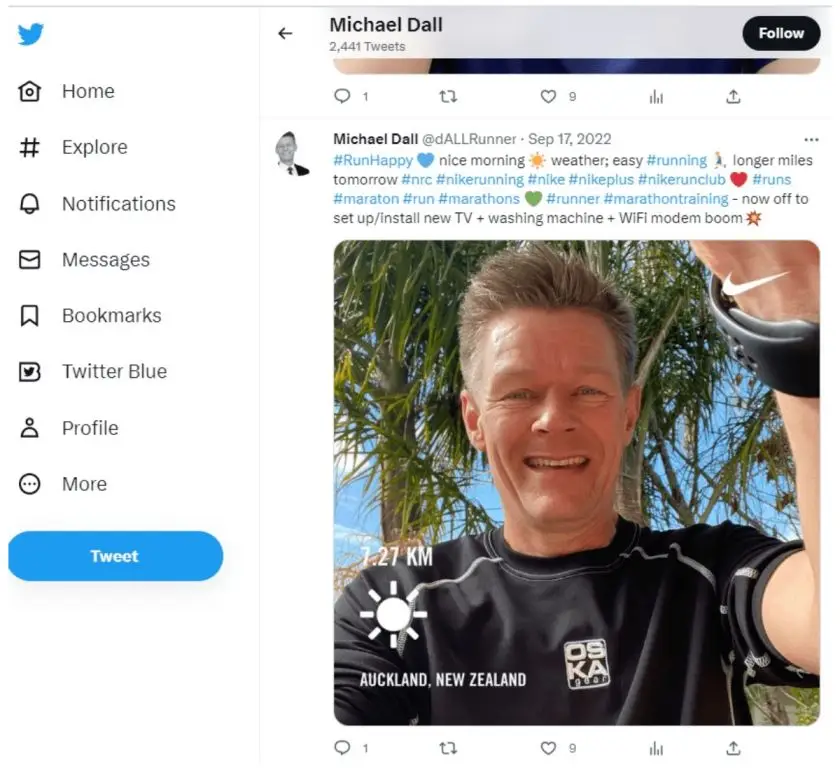
Nike, the famous sportswear brand, launched its NikePlus loyalty program in 2018, which offered a range of benefits and rewards to its members. One of the key features of the program is its social media component, which encouraged members to share their experiences and achievements on social media using the hashtag #justdoit.
NikePlus members earn rewards for sharing their Nike-related experiences on social media, such as completing a workout or participating in a Nike-sponsored event. These rewards can include early access to new product releases, discounts on future purchases, and invitations to exclusive events.
By encouraging its members to share their experiences on social media, Nike has been able to create advocacy loyalty among its customers. Members feel a sense of belonging and community with other Nike enthusiasts, and this motivates them to keep using Nike products and sharing their experiences with others. This creates a positive feedback loop where members become advocates for the brand, which helps to drive even more loyalty and engagement.
5. Behavioral Loyalty: Ultamate Rewards program
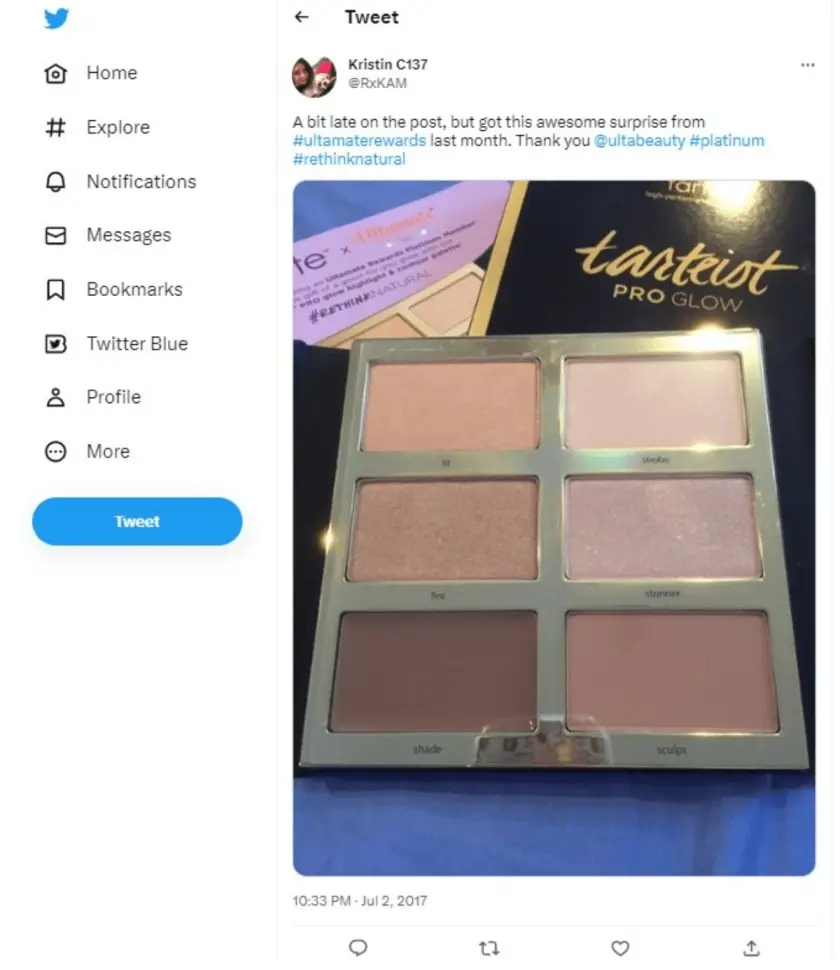
You have probably heard of Ulta before. Ulta Beauty, Inc., founded in 1990, is the largest American network of beauty retailers with a wide variety of cosmetics, skincare brands, beauty tools, and equipment. Ulta launched its loyalty offering- Ultamate Rewards program and has been routinely updating the loyalty offer. According to Forbes, Ulta Beauty in 2022 had 37 million reward members as part of its program and Target was to reach 100 million loyalty members.
The loyalty program allows customers to earn points for purchases made at Ulta Beauty stores and online. Customers can also earn points by engaging with Ulta Beauty on social media, such as following the brand on Instagram or Facebook, sharing posts, and leaving reviews. In addition to earning points, Ultamate Rewards members receive exclusive discounts, free samples, and birthday gifts. Additionally, it uses social media to engage with its customers and promote its products, with a strong presence on platforms like TikTok, and YouTube.
To improve the effectiveness of behavioral loyalty brands like Ulta use machine-learning algorithms to segment different customers into actionable clusters such as deal seekers, high spenders, or occasional browsers. Depending on the insights obtained, loyalty program campaigns are set up for different categories of customers.
By incentivizing customers to engage with the Ulta Beauty brand both in-store and through its social media channels, Ulta has been able to create a sense of behavioral loyalty among its most devoted customers.
These customers are likely to continue purchasing from Ulta Beauty in order to earn points and access exclusive rewards, and they may also be more likely to share their experiences with the brand on social media, further strengthening their loyalty and encouraging others to try the program as well.
6. Emotional Loyalty: Coca-Cola Freestyle
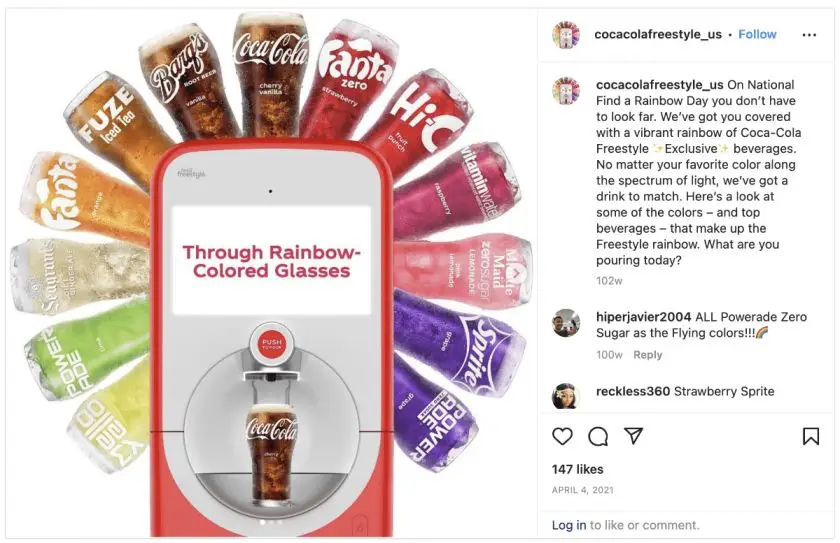
The world-renowned Coca-Cola Company is a total beverage company with products sold in more than 200 countries and territories. The company’s purpose is to refresh the world and make a difference. Coca-Cola came up with a program called Coca-Cola Freestyle, a loyalty program, and a beverage dispensing machine system created by the brand. The machines offer a wide variety of beverage choices, including Coca-Cola products as well as other soft drinks, juices, and flavored waters. The machines are interactive and allow customers to mix and match flavors to create their own unique beverages.
In addition to the beverage selection, it also offers a loyalty program that rewards customers for using the machines and sharing their experiences on social media. Customers can earn rewards such as free drinks, sweepstakes entries, and other prizes by scanning QR codes on the machines and sharing their experiences on social media.
Additionally, the program is designed to create a sense of emotional loyalty and engagement with the Coca-Cola brand by providing customers with personalized experiences and rewards. Ultimately, Coca-Cola Freestyle is a unique approach for Coca-Cola to strengthen its emotional connection with customers by giving them a positive and memorable experience with the brand and rewarding their continued participation and interest. Brands like Coca-Cola share a deep, emotional connection with their customers as they tend to have a more holistic understanding of how they fit into their minds—what those customers need from the brand to make their engagement more fulfilling.
Final Thoughts on Building Customer Loyalty Through Social Media
Holistic customer loyalty programs often delight people so much that they feel compelled to share their experiences on social media, which can bring in new business and loyalty members. They allow you to promote your program quickly and enable you to make tweaks and changes based on customer feedback.
They also give you an action for which you can get points, which is perfect! Getting people to share something on social media is much easier than signing up for an account or sending a friend, and your program can give points when a social share button is clicked. Additionally, social media makes it easy for you to connect with your customers and talk to them, and it also makes it easy for your customers to give you much value.
